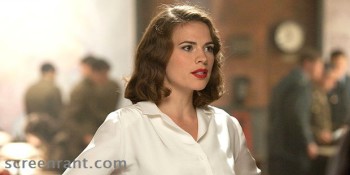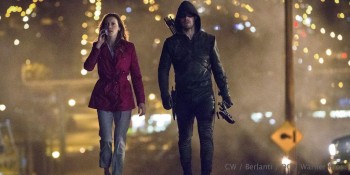Marvel brought a lot of surprises to New York Comic Con, and I’m not just talking about announcing the return of Secret Wars. Fans of the Marvel Cinematic Universe received a few treats as well.
The Marvel’s Agents of S.H.I.E.L.D. panel took place Friday afternoon in a packed Main Hall. Marvel’s director of television, Jeph Loeb, greeted the audience and, after a few minutes of small talk, he reminded the crowd of one lesson we learned last season: trust no one. At that point, he revealed the Hydra T-shirt he was wearing under a fleece jacket.
A shocked and offended Clark Gregg appeared on stage, greeted by a standing ovation. Gregg told Loeb that the only way to make it up to him would be to show us all something we had never seen before — an all new episode of Agents of S.H.I.E.L.D. And so, this week’s episode of Agents of S.H.I.E.L.D. was screened in its entirety four days ahead of time for the fans at NYCC.
The fourth episode of season 2 features a return to more of the lighthearted, witty banter we grew accustomed to last year while not letting us forget things are much darker than they had appeared then. There are some great moments between Gregg’s Director Phil Coulson and team member Melinda May, played by Ming-Na Wen, as well as a really touching scene with Fitz, who is struggling to overcome head trauma. The episode features a neat tie-in to Captain America: The Winter Soldier, though I doubt viewers see it coming. There are lots of twists and turns in this episode, and it’s probably the best of season 2 so far.
Following the screening of Agents of S.H.I.E.L.D., Gregg begged Loeb, on behalf of the audience, to show us something from Marvel’s new series, Agent Carter, set to premiere in January. The series had begun filming the week before, but Loeb had a cut of one scene that had been shot just four days earlier. The clip featured Hayley Atwell as Carter, Dominic Cooper as Howard Stark, and James D’Arcy as Stark’s butler, Edwin Jarvis. Stark is in embarking on an important mission and leaves Jarvis to help look after Carter. The clip wasn’t long enough to really judge what the series will be like, but it piqued my curiosity.
Saturday at NYCC, Marvel unveiled the first footage from its upcoming Netflix original series Daredevil. The series, which will debut next year, stars Charlie Cox as the blind-lawyer-by-day/hero-by-night Matt Murdock, also known as Daredevil. Vincent D’Onofrio plays Daredevil’s adversary, Wilson Fisk, aka “The Kingpin.” The series also stars Rosario Dawson, Elden Henson, Bob Gunton, Toby Moore, Vondie Curtis-Hall, Ayelet Zurer, and Deborah Ann Woll.
Loeb introduced Cox by telling a story of how Marvel Comics writer Joe Quesada, a big Daredevil fan, called him two years ago — before there was even a possibility of producing a Daredevil series — and told him he had found his Murdock. Quesada was confident the Daredevil rights would eventually return to Marvel, and he wanted Cox in that role. Even Loeb admitted to having a bit of a man-crush on the actor who was indeed hired to play Daredevil.
Executive producer Steven DeKnight, also a Daredevil fan, talked of his love for the character; while working on Buffy the Vampire Slayer, he and Loeb would discuss how “we’re gonna do that show one day.”
DeKnight cited both the Frank Miller and Brian Bendis runs of the comics as the main inspirations for the series. In fact, Daredevil’s costume in the clips shown at NYCC bring to mind the outfit drawn by John Romita Jr. in The Man Without Fear. Fans will see these influences reflected in the darker, grittier tone of the show as compared to other Marvel properties.
Cox later confirmed the influence of The Man Without Fear: “Tonally, it suits our show really well.”
“What I love about this show is the moral gray area inherent within,” DeKnight said. “There will be times when you’re not quite sure who to root for.”
As DeKnight phrased it, Murdock is “one bad day away from becoming Frank Castle,” the vigilante antihero also known as the Punisher. Sometimes, the audience will be rooting for Murdock; other times, they may sympathize with the Kingpin.
D’Onofrio seems to enjoy delving into the character of the Kingpin and Fisk, describing him as “a child and … a monster.”
He went on to say that everything Fisk does comes from his own foundation of morality within, and we’ll get to see what aspects of that morality Fisk’s relationship with his wife, Vanessa (played by Zurer), brings out. NYCC attendees got to see the scene of Fisk and Vanessa’s first meeting. It takes place in an art gallery and gives a truly revealing look into Fisk’s personality.
Cox contrasted the creative process of a streaming show like Daredevil to more traditional series, like his work on Boardwalk Empire. Cox identified one of the biggest benefits of being on Netflix to be that there won’t be a week between each episode, so the narrative doesn’t need to remind viewers of everything that has happened — they probably just saw it. Cliffhangers become pointless because viewers can just skip to the next episode. Directors and writers can spend more time on developing a real story without having to worry about recapping anything.
“It’s going to feel like a 13-hour movie,” Cox said of Daredevil.
Three more clips from Daredevil were shown during Saturday’s panel. We saw Karen Page (Woll), known as Dardevil’s long-running love interest in the comics, attacked in her darkened apartment and Daredevil, in a black suit, coming to her aid. The hero’s fight against the assailant escalates, and Daredevil ends up on the street in the rain. There, Murdock flashes back to a conversation with his father, who he tells his son to “get to work.” Daredevil rejoins the fight and takes down the attacker.
Another clip introduced Dawson as Claire Temple, whom Loeb described as a “nurse, who works at night,” strongly hinting at the character of Night Nurse. Temple has discovered a bruised and battered Murdock on the street and brings him to her apartment to help him. Murdock is concerned that she has removed his mask and has now seen his face.
In the third clip, Page thanks Murdock and his best friend and law partner, Foggy Nelson (Harden), for winning her case by supplying them with dinner. She then volunteers to help them around the office and clean for free — which prompts a moment of levity when Murdock asks if their office is messy.
Just from these clips, it is clear that Daredevil has a darker and more serious tone than Agents of S.H.I.E.L.D. However, that doesn’t mean it’s taking place separate from the rest of the MCU. When asked at NYCC about its relationship to the other Marvel properties, Loeb stoked the fires of fans everywhere with a smile and Marvel’s latest catchphrase:
“It’s all connected.”

